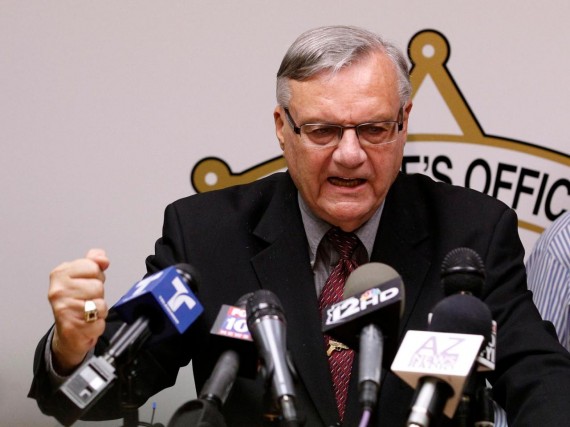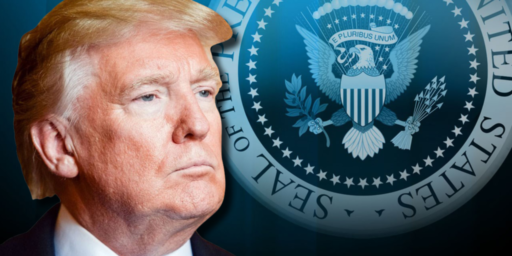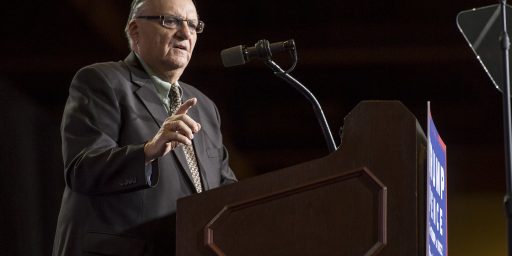The Arpaio Pardon and Charlottesville
The president's decisions to pardon Joe Arpaio sends a clear signal in the wake of Charlottesville.
 The president’s decisions to pardon Joe Arpaio sends a clear signal in the wake of Charlottesville.
The president’s decisions to pardon Joe Arpaio sends a clear signal in the wake of Charlottesville.
Over roughly a two-week period Trump has been in a position of trying to defend his response to Charlottesville. He is clearly aware that his statements have not been well-received given that he spent a great deal of time at his campaign rally in Phoenix trying to demonstrate how great his response actually was. Of course, the fact that he omitted the infamous “on many side” part of his initial statement underscores he knows full well that he created some of his own problem (the irony of misrepresenting himself while at the same time asserting the coverage of his statements were “fake news” just adds whole addition layers of problems to this entire conversation).
So, Trump had some options in the wake of Charlottesville. One was to find a way to demonstrate that he was cognizant that he was being seen as minimizing (if not being sympathetic) to the white supremacists currents on display in recent days or he could double down in a way that sent a clear signal to certain segments of his base.
Well, he previewed his position in Phoenix and then yesterday he sent a very clear signal Friday: the Arpaio pardon will not reassure Americans who are rightly concerned that the president has not shown sufficient understanding of the racial tensions in the country and, in fact, concerns that he is sympathetic to groups who harbor white supremacist views.
Let’s be clear: Arpaio’s reputation, which makes him a hero to some, was built on mistreatment of persons of color in his custody, specifically Latinos. This applies to contempt charge for which he was pardoned, but his exploits go well beyond that racial profiling issue. Pardoning Arpaio negates the notion that “rule of law” is what is truly important to Trump. Arpaio was clearly violating the law and has been forgiven for it. This is evidence that “rule of law” is frequently code for “using law enforcement powers to target persons of color because they make some white people feel uncomfortable.” Further, and along those lines, pardoning a law enforcement official who behaved as Arpaio did is a signal that Trump does not take seriously the ongoing discussion of police violence aimed at minority citizens.
“Trump is Arpaio writ large for many conservatives in the state,” said Terry Greene Sterling, a writer-in-residence at Arizona State University who has tracked Mr. Arpaio’s career for decades. “But for many Latinos and an increasingly diverse resistance, Arpaio is a symbol of everything that’s wrong with immigration policies.”
This is precisely how the action will be viewed by any Latinos (and non-Latinos, myself included).
Here are Arpaio’s own words from 2009:
“They hate me, the Hispanic community, because they’re afraid they’re going to be arrested. And they’re all leaving town, so I think we’re doing something good, if they’re leaving.”
Note that he didn’t even say “the illegal immigrant community.” Rather, he said “the Hispanic community.” He was bragging about being feared by a significant segment of the citizenry he was supposed to protect because they had a certain ethnic characteristic. He also did not differentiate legal residents from the undocumented when he stated “they’re all leaving town.” Let us please remember that many Hispanic families can trace their residency in what is now Arizona back well before the territory was even part of the United States.
A side note: much of the details of this case is about federalism (as is, actually, the whole “sanctuary city” discussion). Immigration law is federal, not state, law. It is simply not the jurisdiction of a county sheriff to enforce (let alone interpret) federal law. It is fine for a local law enforcement official to report to federal law enforcement that someone legally in their custody might also be in violation of federal law, but it is not the job of local law enforcement to go around looking for persons who might be breaking federal law. This is especially true if the grounds by which this activity is being undertaken is a racial profiling. This should be obvious.
The basic problem with Arpaio is this: his approach was unambiguously racially-motivated. Hence, his pardon further deepens Trump’s alliance to the politics of white supremacy (in this case: the clear endorsement of a white politician and law enforcement official who abused his power to target a minority population).
See, also, Reason Hit and Run: Trump Pardons America’s Worst Lawman, Sheriff Joe Arpaio and this editorial in the Arizona Republic: Our View: Donald Trump just resurrected Joe Arpaio from irrelevance.
I was going to also discuss a report that Trump is likely ready to end DACA and that he has officially banned transgender military recruits as further issues of signaling, but the Arpaio stuff took over.






I think that Trump is simply deeply afraid of losing the support of the white supremacists and neo-Nazis who constitute the bulk, if not the entirety, of the alt-right. Remember the sequence of events after Charlottesville? When Trump made his pathetic attempt to be conciliatory–under obvious duress, I should note–David Duke had a message for him:
“I would recommend you take a good look in the mirror & remember it was White Americans who put you in the presidency, not radical leftists.”
Or it may merely be that Trump is afraid of the alt-right, period. Physically afraid of them. For all the bombast, you know that Trump is, to use one of his favorite locutions, a pussy.
To the right, “rule of law” has simply meant that the outcome suits their biases on whatever topic triggers the meme for about as long as I can remember. My mom held that “no one should be charged with murder as long as that murdering Ted Kennedy is not in prison” for decades. Over time “travesty of justice” evolved into “contempt for the rule of law,” but the spirit and goals are the same.
That there is what I find most terrifyingly about the Trump *presidency. Our capacity for being outraged is being overwhelmed by the constant flow of sewage flowing from his administration.